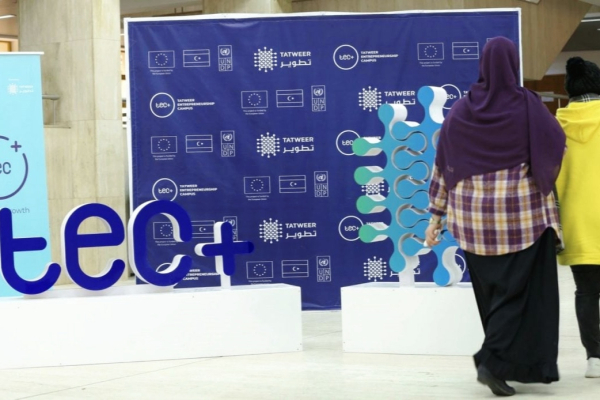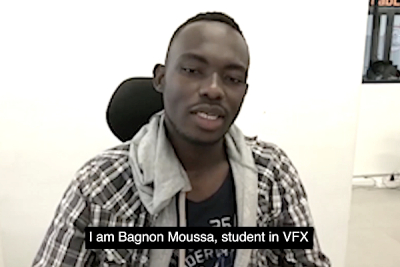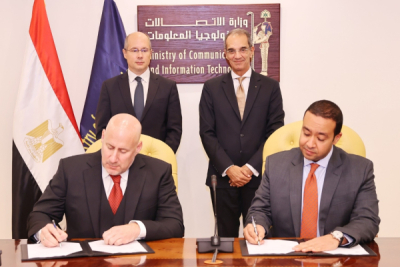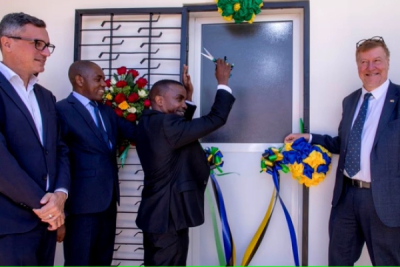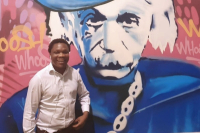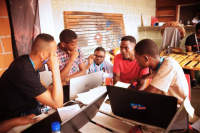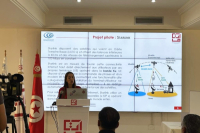Tatweer Research is a key player in the Libyan technology landscape. Through its innovative programs and commitment, the organization aims to increase the impact of technology on economic development in Libya.
Tatweer Research is a national economic development agency that aims to transform the Libyan economy into one based on knowledge, innovation, and the export of cutting-edge technologies. It was founded in 2010 by Khaled Elmufti, a computer scientist with degrees from Imperial College London and City.
The agency operates through three main activities: research, development, and professional excellence. It works on solving global problems in the fields of environment, climate, energy, business transactions, medical technology, and education.
Through its Tatweer Entrepreneurship Campus (TEC), Tatweer Research has set up innovation initiatives and skills development programs like the Graduate Program to educate, train, and empower Libyan youth and leaders. It has also created a 1,200-hectare free economic zone and Tech City in Libya.
The agency encourages Libya's brightest young people, incubating the ideas of ambitious local entrepreneurs while attracting international talent and investment. Through its Coding for Children (C4C) program, it introduces primary school children to coding, strengthening their capacity for innovation and creative thinking.
In partnership with the European Union and UNDP, Tatweer Research aims to promote entrepreneurship and encourage job creation outside the public sector. The organization is contributing to the transformation of the Libyan economy from one based on natural resources to one focused on innovation and entrepreneurship.
Melchior Koba
The ongoing digital revolution has encouraged a growing number of young Africans to venture into the path of entrepreneurship and innovation, giving the continent a glimmer of hope. However, their endeavors are sometimes slowed by the lack of financing.
The Baobab Network, a startup accelerator providing technical and financial support to entrepreneurs in Africa, announced on Thursday, October 5 its intention to invest in a thousand African technology companies over the next decade.
"We have the platform to dramatically scale the number of investments we review and execute across Africa. Our goal is to empower 1000 start-ups, catalyzing innovation and driving economic growth across the continent," said Baobab co-founder Toby Hanington.
Around 60% of Africa's population is under the age of 25, making the continent the world's youngest. This translates into a large youth population, and highlights the immense potential for youth-led innovation, entrepreneurship, and economic growth.
Like The Baobab Network, multinationals like Microsoft believe in the potential of this enterprising youth and are investing accordingly. In 2022, the American computer software company announced its plan to support the growth of around 10,000 African startups over the next five years.
According to its executives, Microsoft intends to become "one of the cornerstones of the continent's digital economy and provide relevant solutions to Africa's societal challenges". For the company, this means working towards an explosion of local innovations that will contribute positively, not only to Africa's digital economy, but also to global society.
Since its launch in 2019, Baobab has invested in 45 startups in 15 African countries. Thanks to the establishment of its new co-investment vehicle, future cohorts will benefit from an investment of $100,000 each, up from $50,000 previously. The new cohort includes Brandrive, PocketFood, and Bunce (Nigeria), as well as Kawu (Uganda) and Alal (Senegal).
Samira Njoya
Moussa Bagnon, one of the members of the Ivorian team that won the Sony Talent League last March recently agreed to talk to We Are Tech Africa. During this interview, he discusses the competition, his ambitions for the animation and special effects sectors as well as the Afro VFX training program that enabled him to enter the industry.
We Are Tech: Hi Mr. Bagnon, can you tell us a bit about your background?
Moussa Bagnon: I have a degree in electronics and a passion for the digital, photography and video. I was part of the first cohort of the Afro VFX training course organized by Orange Côte d'Ivoire in 2022. The aim of the course was to introduce young people to special effects and animation.
WAT: Before this training, were you already familiar with special effects and animation?
MB: No, I had no prior knowledge. I did start out in related fields with computer graphics and video editing. I had some idea of the tools that could be used to create 3D and animation, but I had no skills in these areas.
WAT: How did you join the first cohort of the Afro VFX training program?
MB : I heard about the training at the Orange Digital Center Côte d'Ivoire, a center dedicated to coaching and developing digital skills. I took part in Orange Summer Challenge 2021, a summer internship that enables young people to carry out a project to solve a social problem. After that, I kept up a good relationship with the members of the Orange Digital Center Côte d'Ivoire, which I visited regularly. Then I heard about Afro VFX and applied.
WAT: How did the apprenticeship go when you were selected?
MB: The apprenticeship began with MASTERCLASSES on special effects. Following a selection process, the most motivated and able, whether amateurs or beginners, were selected to follow the certification course. The first sessions focused on Maya software for 3D modeling and animation. Next, we learned about simulation using software such as Houdini. The sessions took place online every Saturday with different trainers over several weeks.
WAT: Did the training meet your expectations? In particular, in terms of the animation skills you were looking for?
MB : When I entered the Afro VFX program, what I really wanted was to be able to animate and create special effects like professionals. I can't say that I have become a professional after the course but I did learn a lot about the basics of the trade. We were given technical skills, but first, we had to learn about the industry's ecosystem with the world of studios and how animators collaborate. I believe three months of training can not make me a professional who can start applying for animation jobs. It is just an initiation. Also, I was looking to upgrade myself to international animation and special effects standards. So, this level can’t be reached within just three months. Nevertheless, I have learned a lot and I’m still learning. We are already seeing animation projects by very talented people in Côte d’Ivoire, but I’m really aiming for international standards. So, I still want to improve my skills.
WAT : With the skills you acquired during the 3-month training, you and other students from the Afro VFX cohort won the Sony Talent League (a worldwide digital competition) in March with your animated documentary "Djossi Heroes". How did you get to take part in such a high-profile competition when you were still not confident your skills would match international standards?
MB : We heard about the competition through Dedy Bilamba, one of the co-founders of the Afro VFX program, who shared the competition link with us. We heard about it a few weeks before the first deadline, but the criteria were really up to the international standards I was aiming for, for example. It was an opportunity for us to gauge our current level. We set off to discover the competition and put our new skills into practice. We didn't really think we'd win the competition. First, we had to submit a pitch, and out of the 600 projects submitted, five, including ours, were selected and then we had to work for 10 weeks with our mentors to present the final version.
WAT: Can you tell us about the project that made you win the competition?
MB : It's called Djossi Heroes, a 15-minute documentary series that puts the spotlight on petty traders. The first episode, for example, is about a water vendor and her business. For us, these people are everyday heroes. Our job was to use animation to bring the heroine's ambitions and dreams to life so that they would shine in the documentary. We collaborated with two other students from the Afro VFX cohort and a cartoonist, under the supervision of our instructors who helped us structure the project.
WAT: What do you think attracted the judges to Djossi Heroes?
MB : The 5 finalists submitted great projects, but I think what made the difference with our project is the social impact and awareness-raising on immigration and other important subjects that we dealt with in the episodes. I think the jury was more attracted by the impact of our project.
WAT: What do you plan to do next?
MB: For now, the plan is to improve Djossi Heroes. The next step will be to find investors to finish and distribute it on a large scale. At the same time, I will continue to train myself to reach the skill level I desire. I want to contribute to the improvement of animation and special effects in Côte d'Ivoire, and Africa.
WAT: Are you planning to take part in the next Afro VFX cohort?
MB : Of course. The first cohort was more of an initiation than anything else. The second cohort provides for real specialization, and there I'll have the opportunity to choose a very specific area of special effects. It's a much broader sector than you might think. There are people who do texturing, some specialize in animation, others in composition. I will have the chance to perfect my simulation skills.
WAT: You've greatly stressed on international standards. Do you think that Africa is still far from reaching those standards?
MB: We're gradually getting there. With what we're seeing in certain countries like Nigeria and Côte d'Ivoire, there are quite a few studios doing good work. We're not up to international standards, but we're not far off.
WAT: Do you think there's a real demand for animation specialists in Africa right now?
MB : I think there's a real need because the continent is producing more and more content, especially animated films. There are more and more African projects of this kind, but the people behind these initiatives are often obliged to outsource the animation part and entrust it to professionals outside Africa, in order to get quality animation. That's why training is so important. In Africa, we have great stories, but we need to train animators and special effects specialists to perfect the narration.
WAT: What message would you like to pass on to young people like yourself who want to get into animation and special effects?
MB: I want to encourage them because we're seeing more and more African animated films on well-known platforms like Netflix, so we can say that the sector is growing. Africa is very closely watched by the outside world in this field, so I'd ask them not to hesitate. It's a sector that feeds its people and has a future. I'd also like to appeal to African authorities for more support in the field because it can create a lot of jobs for Ivorians and Africans in general.
WAT: I think your appeal will be heard. Thank you for your time.
MB: Thank you too.
Interview by Servan Ahougnon
Incumbent operator Telecom Egypt is gradually moving towards its goal of becoming the leading connectivity services provider in the region. As part of its strategy, the company is teaming up with like-minded international partners.
Egyptian telecom operator Telecom Egypt and 4iG, a Hungarian IT service management company, signed a memorandum of understanding in Cairo on Wednesday, October 4, to link Egypt and Albania via a high-capacity fiber optic submarine cable.
The cable to be built will be a new traffic entry to Europe via Albania and will add a new multiple route to Egyptian-European traffic. "With an open access model and multiple branching units, the system is set up to be a new European cable entry point with a different transit passage compared to the already existing Mediterranean routes to the main internet Point of Presence (PoP) such as the ones in Frankfurt in addition to numerous potential Points of Presence in Eastern Europe," said 4iG in a press release.
For Budapest-based 4iG, the new agreement represents a gateway to “enter as a new player in the market for intercontinental data transmission infrastructure between Europe and Asia, and Europe and East Africa.” Meanwhile, Telecom Egypt indicates that the initiative is part of its strategy to diversify transit options in the Mediterranean basin by means of multiple, high-capacity submarine cables linking Egypt and Europe.
According to Amr Talaat, Egypt's Minister of Communications and Information Technology (MCIT), the country is already connected to 14 international submarine cables, and work is underway to establish five new cables. In addition, Telecom Egypt is the partner of choice for the deployment of submarine cables for over 160 companies worldwide.
Ultimately, the new submarine cable will, among other things, facilitate connectivity in the countries concerned and create new opportunities for cooperation with partners in many countries.
Samira Njoya
On Monday, October 2, Tanzanian authorities inaugurated the Center for Competence in Digital Education (C-CoDE), the fruit of collaboration between Morocco's Mohamed VI Polytechnic University (UM6P) and Switzerland's Ecole Polytechnique Fédérale de Lausanne (EPFL).
The center, hosted by the Nelson Mandela African Science and Technology Institution (NM-AIST), was built thanks to an endowment of over $100,000 from the United States. Among other things, the center will support the digital transformation of training and education practices in Tanzania and the East African Community (EAC).
The solution was launched by two tech entrepreneurs, with the aim of giving people access to decent labor.
Saweblia is a digital platform developed by a Moroccan startup. It connects users with craftsmen such as electricians, plumbers, handymen, and painters. The Casablanca-based startup behind the solution was founded, in 2015, by Reda Lakhlifi and Mohammed Ait Addi. It aims to revolutionize the breakdown service market by combating dishonest service providers.
The startup is yet to launch a mobile application for its solution. So, users can access its services only through its web platform or its Whatsapp account. Whether it's repairing a door handle, an electrical fault, a water leak, or even a jammed lock, Saweblia has the manpower to deal with almost every problem.
"All our craftsmen have a legal status and their identity and criminal record are checked by our teams. Our craftsmen follow a multi-step process to ensure their expertise and know-how. They pass several levels of validation before arriving at your premises. Once they've been validated, we train them in our internal quality charter and monitor their progress to ensure continuous quality of service," explains the startup.
Currently, its services are accessible to users in Casablanca and Marrakech. There is no need to create an account to request the services. When needed, a user only has to click on the “I need a service” button on the web platform, choose his/her city, and select the type of service needed. For multiple services, users need to submit personalized requests. To do this, they need to describe their specific situations and add pictures to allow the customer relations managers to take over from there.
"We may need to arrange a visit with one of our works coordinators for complex requests. Once the requirement is clear, we send you a quote within 20 minutes to 48 hours (depending on the nature of the work to be carried out). As soon as you confirm the estimate, we schedule an intervention according to your availability," explains the platform.
Saweblia offers customers a range of payment options once the work has been completed. These include online payment by credit card on the website, cheque, bank transfer, or cash. In addition, if the cost of the order exceeds 1,000 Moroccan dirhams (around $97), the startup requires a deposit.
Adoni Conrad Quenum
Born and raised in South Africa, he gained experience working for large organizations in his home country. The success of his company Whoosh Innovations is a testament to his entrepreneurial achievement.
Lebeko Mphelo (photo) is the founder and CEO of Whoosh Innovations, a South African company specializing in digital payment solutions. He graduated from the University of Pretoria in 2009 with a Bachelor's degree in Econometrics.
He founded Whoosh Innovations in 2014 with the ambition of a web and mobile platform offering customized solutions to merchants and enabling them to process transactions both online and offline. The company enables merchants to collect payments by credit card, e-wallet, and bank transfers. It also provides consulting and project management services to ensure the optimal deployment of payment gateways.
In 2020, Whoosh Innovations was chosen as the official payment system provider for the presidential gala dinner of the ANC, South Africa's ruling party. This was an opportunity for Lebeko Mphelo and his team to demonstrate their ability to manage large transactions and deliver quality service to prestigious customers.
Lebeko Mphelo, the brain behind that innovation, gained professional experience working for large institutions. In 2009, he worked as a junior consultant for Deutsche Gesellschaft für Internationale Zusammenarbeit (GIZ) GmbH. The following year, he joined financial services company Alexforbes as a trainee risk analyst, before successively holding the positions of assistant research analyst and member of the company's inaugural Junior Board. At the same time, between 2011 and 2019, he was the Director of Etico Capital, an investment company focused primarily on the agriculture, resources, and financial services sectors.
A former beneficiary of the Google for Startups Accelerator Africa program, Lebeko Mphelo is an example of entrepreneurial success and contribution to the economic and social development of his country.
Melchior Koba
Right from the heart of Kinshasa, Democratic Republic of Congo, the digital innovation center fosters innovation and helps bridge the digital divide across Africa.
Lumumba Lab, or LLab, is a cultural, civic, and digital mediation venue located in Kinshasa, Democratic Republic of Congo. Founded in 2012 by Filip Kabeya and Idriss Mangaya, this innovation laboratory is on a mission to bridge the digital divide and boost employment in the DRC, through digital innovation.
LLab offers a variety of activities and programs around the use and manufacture of digital tools. It particularly focuses on women, people living with disabilities, and those living in marginalized territories.
Its activities include La Mine, a training program aimed at equipping women with digital skills to help them set up their businesses or find a job. There’s also Handihack, which promotes the inclusion of disabled people through digital training courses. La Villa Digitale, meanwhile, is a collaborative space that encourages citizen innovation in selected communities and engages in sustainable actions to support the communities’ initiatives.
Every year, it touches the lives of over 6,000 people and organizes at least 30 training courses. In 2019, it organized the Lumumba Lab Tech Awards to encourage champions who have made their mark on the digital ecosystem in the Democratic Republic of Congo.
LLab is inspired by one of the sentences contained in the last letter sent by Congolese national hero Patrice Lumumba to his wife: “The day will come when [...], Africa will write its own history and in both north and south it will be a history of glory and dignity.” As a contribution to that history, LLab wants to help write Africa's digital history, by highlighting innovations that have a social impact and are in line with the Sustainable Development Goals (SDGs).
Melchior Koba
The test is carried out in preparation for a service rollout in 2024.
American satellite service provider Starlink has rolled out its services in Tunisia for a three-month trial period. This was announced, on Monday, October 2, by the Ministry of Communication Technologies during a workshop organized to discuss the present and future situation of satellite internet in Tunisia.
The test will be carried out in three cities, namely Tunis, Ariana, and Gabes. It aims, among other things, to help discover satellite Internet technologies and compare them with traditional methods currently available in Tunisia, such as internet services offered by telecom operators, fiber optics, or subsea cables. It will also offer the opportunity to review the legal and regulatory framework surrounding the marketing of the services as well as the business model.
Tunisia, like most countries on the continent, is looking for alternatives to connect the majority of the population, in this case those in landlocked and/or remote areas, through its national strategy for the development of digital infrastructure and technical solutions. This pilot phase follows Tunisian ICT Minister Nizar Ben Néji's visit to the United States in July. During his visit, the government official signed a partnership agreement with the American firm to enable his ministry, the national spectrum agency, the Telecommunications Research and Studies Center, and the telecoms regulator to draw up licenses for the provision of satellite Internet services.
According to its roll-out schedule published earlier this year, Tunisia is not due to receive Starlink’s internet services in 2024. The pilot phase launched this month (the first month of the fourth quarter of the year), confirms this schedule.
Let’s note that according to DataReportal, in Tunisia, Internet penetration rate was 66.7% in 2022.
Adoni Conrad Quenum
With the advent of digital technology, Kenya has turned to biometrics to improve the identification of its population. Thanks to a system already in place, in the coming months the executive will be able to provide a digital identity to all registered citizens, refugees, and foreigners.
Kenya has postponed the launch of its "Maisha Namba" digital identification system and biometric identity cards originally scheduled for October 2. In a statement released on Friday, September 29, Julius Bitok (photo), Principal Secretary of Immigration and Citizen Services, said that a new date would be communicated in due course.
“We wish to inform the public and all stakeholders that due to unavoidable circumstances, the official launch of the Maisha number and the digital ID ecosystem that was to be presided over by his excellency, President William Ruto on October 2nd has been postponed,” Julius Bitok indicated in the release, adding that nationwide public and stakeholder engagement activities and forums on Maisha Namba would continue as planned.
Last August, when signing an agreement with the UNDP to raise funds to support the development of the said system, the government indicated that it would be launched on October 2. The system is in line with the executive's actions to improve government services through digital transformation, to digitize up to 80% of the said services. Through the new system and the biometric identity card, the government aims to provide every Kenyan with a unique number that will become his/her personal identity number for life.
Samira Njoya
More...
He is an experienced software developer with a proven track record in several companies. His company, Comparoshop, uses artificial intelligence to optimize e-commerce operations across Africa.
Didier Tagne (photo) is a co-founder of Comparoshop, a company that uses artificial intelligence to improve e-commerce operations in Africa. Born in Cameroon, he began higher education, in 2018, at the University of Douala. He enrolled in computer science but dropped out to fully devote himself to his passion: coding.
In 2022, he launched Comparoshop, offering business-to-business (B2B) and business-to-consumer (B2C) solutions. For consumers, the company has developed a search engine to organize specialized e-commerce websites. Its aim is to facilitate access to information on products and services available online, enabling users to compare prices, features, and customer reviews. The solution is currently only available in Cameroon and Algeria.
For e-tailers, Comparoshop offers a ready-to-use sales site. It enables users to automate product catalog uploads, improve user experience and shopping cart conversion rates, and track market trends and competition in real-time. It also helps merchants run marketing campaigns using a targeting approach.
Currently, Didier Tagne is the data scraping specialist for Egyptian cybersecurity company Buguard and a software developer for Cameroonian financial institutions Malea Investment and SAMU ATC. His professional career began, in 2020, as a full-stack developer at Net Africa SARL, an IT company that he left in 2022.
He has also worked remotely for several other companies. In particular, he was a Python web developer for companies such as HBC (2021-2022), a company providing business services such as human resources management, and Cyberzone (2021), a cybersecurity start-up. From August 2022 to January 2023, he was a web developer with the digital agency FBK-COMPANY in Cameroon.
A beneficiary of the Africa by IncubMe program in 2022, Didier Tagne has received several national and international awards. Also in 2022, he was the winner of the Douala Hackathon organized by KELMASS SARL, the TechStars AI issued by the African Artificial Intelligence Society, and QuickDo Canada's Cybersecurity Challenge.
Melchior Koba
In today's digital age, the importance of a skilled workforce cannot be overstated. That's why governments all around the world are working hard to upskill their youth and drive growth.
President William Ruto announced, Sunday October 1, successful negotiations with tech giants Google, Intel, and Apple, which would result in the creation of over 300,000 job opportunities for Kenyans in the digital sector. The announcement was made during a church service in Nairobi.
The said negotiations were made during the President's visit to the United States, where he toured these tech companies. They underline the government's commitment to fostering digital opportunities for the Kenyan youth.
With over 70% of Kenya's population under the age of 35, this demographic dividend offers a unique opportunity for the nation to tap into the global digital economy.
This collaboration with global tech giants marks a pivotal step toward transforming Kenya's digital landscape, creating an environment where businesses and the nation's youth can thrive in a seamlessly interconnected digital world. President Ruto's announcement underscores the government's dedication to improving the digital payment landscape in Kenya, ultimately empowering individuals and businesses alike.
Hikmatu Bilali
Last week, Starlink signed an agreement with Paratus for the distribution of its services through Paratus. It is now teaming up with Jumia to further its expansion in Africa.
On Monday, October 2, e-commerce platform Jumia announced a partnership with American satellite Internet provider Starlink to expand its services in Africa. The aim is to market Starlink kits and terminals in the eleven countries where Jumia operates, starting with Nigeria and Kenya.
"We have seen Starlink do these types of deals in Southeast Asia and South America, and now Africa will also have the opportunity to access fast-speed internet services. The plan is to start selling through our sites and agents in Nigeria this month, and then Kenya," explained Hisham El Gabry, Jumia's Chief Commercial Officer.
Starlink, which is already present in Nigeria, Rwanda, Mozambique, Kenya, and Malawi, is multiplying partnerships to facilitate access to its Internet access kits and terminals. Jumia, with its 8.4 million active consumers and one billion visits by 2022, may prove to be a partner of choice, especially as it will also make it possible to reach regions where official addresses and city mapping are limited, unworkable, and/or economically unviable for traditional providers such as mobile operators.
"We had to establish our own business models and transportation network, even mapping to a certain extent when we started building an African e-commerce business," added Hisham El Gabry.
This year, Starlink was planning to roll out its satellite internet services in 23 African countries. However, as of the start of the fourth quarter, it is present in only five countries. The delay is due, among other things, to the time-consuming procedures in obtaining operating licenses in several countries.
Adoni Conrad Quenum
Telecom operators are increasingly investing in fifth-generation Internet. In Sierra Leone, French telecom giant Orange is entering this segment, adding to the list of countries where it has already launched 5G.
Last week, Orange Sierra Leone announced the launch of the pilot phase of fifth-generation mobile Internet, to offer subscribers higher connection speeds, improved connectivity, and low latency. This pilot phase will take place solely in the business district of Freetown, the country's capital.
"This launch is indeed an important milestone for Sierra Leone. I am delighted that Orange Sierra Leone is taking the lead in setting the baseline technology standard for 5G by deploying this state-of-the-art pilot phase on our network, in line with the company's vision to become a leading mobile Internet service provider in Sierra Leone," said Sekou Drame, Chairman and CEO of Sonatel, the parent company of Orange Sierra Leone.
During an audience with Sonatel’s delegation, Julius Maada Bio (photo, center), President of Sierra Leone, praised the initiative. Internet is a key point in Sierra Leonne’s 2019-2029 National Innovation and Digitalization Strategy. In that context, the 5G test is in line with authorities’ ambition to boost access to the Internet.
Let’s note that Orange is multiplying its investments in 5G technology on the continent. Among other countries, the telecom company has carried out 5G commercial tests in Botswana, Tunisia, DRC, Côte d’Ivoire, and Senegal. Last week, it inaugurated a 5G lab in Madagascar, to enable local tech players to discover this technology, demonstrate use cases, and test its impacts on their products and services.
Adoni Conrad Quenum


